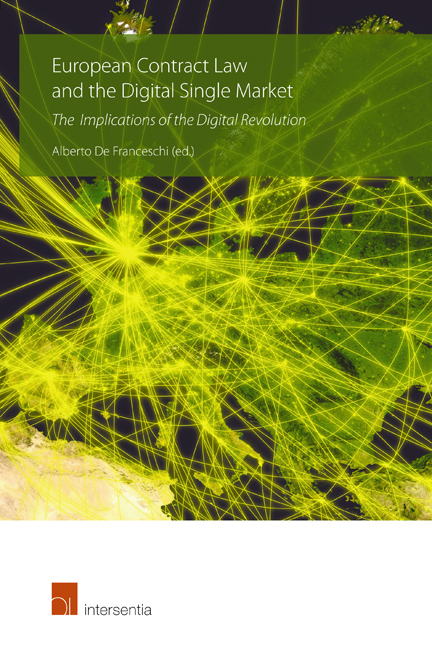Book contents
- Frontmatter
- Preface
- Contents
- List of Authors
- European Contract Law and the Digital Single Market: Current Issues and New Perspectives
- PART I THE IMPACT OF DIGITAL TECHNOLOGY ON PRIVATE LAW RELATIONSHIPS
- PART II DATA AS A TRADEABLE COMMODITY AND THE NEW INSTRUMENTS FOR THEIR PROTECTION
- PART III THE LEGISLATIVE INSTRUMENTS FOR A DIGITAL SINGLE MARKET
- A European Market for Digital Goods
- Supply of Digital Content. A New Challenge for European Contract Law
- Reflections on Remedies for Lack of Conformity in Light of the Proposals of the EU Commission on Supply of Digital Content and Online and Other Distance Sales of Goods
- The Proposal of the EU Commission for a Regulation on Ensuring the Cross-Border Portability of Online Content Services in the Internal Market
- The Law Applicable to Consumer Contracts in the Digital Single Market
- PART IV NEW FEATURES OF STANDARD CONTRACTS IN THE DIGITAL MARKET
- PART V ONLINE PLATFORMS IN THE ‘SHARING ECONOMY’
The Law Applicable to Consumer Contracts in the Digital Single Market
from PART III - THE LEGISLATIVE INSTRUMENTS FOR A DIGITAL SINGLE MARKET
Published online by Cambridge University Press: 12 December 2017
- Frontmatter
- Preface
- Contents
- List of Authors
- European Contract Law and the Digital Single Market: Current Issues and New Perspectives
- PART I THE IMPACT OF DIGITAL TECHNOLOGY ON PRIVATE LAW RELATIONSHIPS
- PART II DATA AS A TRADEABLE COMMODITY AND THE NEW INSTRUMENTS FOR THEIR PROTECTION
- PART III THE LEGISLATIVE INSTRUMENTS FOR A DIGITAL SINGLE MARKET
- A European Market for Digital Goods
- Supply of Digital Content. A New Challenge for European Contract Law
- Reflections on Remedies for Lack of Conformity in Light of the Proposals of the EU Commission on Supply of Digital Content and Online and Other Distance Sales of Goods
- The Proposal of the EU Commission for a Regulation on Ensuring the Cross-Border Portability of Online Content Services in the Internal Market
- The Law Applicable to Consumer Contracts in the Digital Single Market
- PART IV NEW FEATURES OF STANDARD CONTRACTS IN THE DIGITAL MARKET
- PART V ONLINE PLATFORMS IN THE ‘SHARING ECONOMY’
Summary
THE SUBSTANTIVE LAW BACKGROUND
In its 2015 proposal for a Directive on certain aspects concerning contracts for the supply of digital content, the Commission stated that ‘nothing in this Directive should prejudice the application of the rules of private international law, in particular Regulation (EC) No 593/2008 (Rome I) and Regulation (EC) No 1215/2012 (Brussels I a).’ The same is true for the 2015 Proposal for a Directive on certain aspects concerning contracts for the online and other distance sales of goods. In the eyes of the Commission, the relevant private international law instruments were adopted quite recently and the implications of the Internet were considered closely in the legislative process. The Commission thinks that the existing confl ict-of law rules take specific account of Internet transactions, in particular those on consumer contracts. In fact, the rules laid down in Rome I (Article 6) aim at protecting consumers, inter alia, in the Digital Single Market by giving them the benefit of the non-derogable rules of the Member State in which they are habitually resident. But they do not specifically address the phenomenon of online advertising and/or the online formation of contracts. Nevertheless, according to the Commission, together with the proposed contract rules for the purchase of digital content, the existing rules on private international law establish a clear legal framework for buying and selling in a European digital market, which takes into account both consumers’ and businesses’ interests. Therefore, the legislative proposals aiming at the creation of a digital single market do not require any changes to the current framework of EU private international law, including the Regulation (EC) 593/2008 (Rome I).
At a substantive law level, with its proposals for two directives on the supply of digital content and online sales of goods, the Commission provides a comprehensive legal framework for a private law in the digital world. The rules for the supply of digital content enter to a large extent legal terra incognita and are therefore ground-breaking. The rules for online sales of goods result in the full harmonisation of large parts of the consumer warranty law and therefore have an extensive impact on the sales law of the Member States.
- Type
- Chapter
- Information
- European Contract Law and the Digital Single MarketThe Implications of the Digital Revolution, pp. 173 - 186Publisher: IntersentiaPrint publication year: 2016



